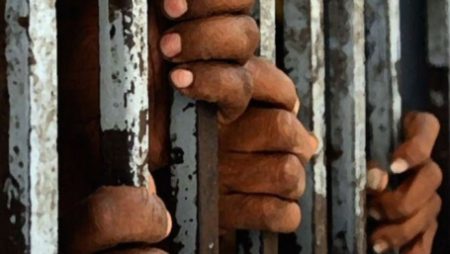32 Palestinian prisoners suffering from different disabilities are being held in Israeli detention centers without receiving suitable medical care, according to a report released by the Palestinian Prisoners’ Center for Studies (PPCS) on Sunday.
Center spokesperson Riyad al-Ashqar stated according to Ma’an News Agency, that Israeli use of torture against Palestinian prisoners had dramatically increased the number of disabled prisoners, with many suffering from permanent disabilities, due to injuries sustained during violent interrogations.
The statement noted that Israel Prison Service (IPS) authorities routinely did not provide disabled and injured prisoners with necessary equipment such as wheelchairs for those.
According to the center, 35 year-old Palestinian prisoner Luay Sati al-Ashqar, from the northern occupied West Bank city of Tulkarem, suffered complete paralysis in his left leg, as a result of injuries he sustained during a violent interrogation by Israeli officials.
After spending three years in prison, Luay Al-Ashqar was then released, only to be redetained by Israeli forces three more times, despite his medical condition.
Palestinian prisoner Nader Abd al-Qader Masalma, from the southern West Bank city of Hebron, had suffered a complete paralysis in both of his legs due to “torture” during interrogations, according to the statement.
Al-Ashqar said that Israeli forces “don’t hesitate to detain disabled Palestinians and torture them,” highlighting that, more often than not, Israeli officials refuse to provide injured and disabled Palestinian prisoners with medications or wheelchairs during detention.
He noted that 48-year-old Palestinian prisoner Adnan Yassin Hamarsha, from the northern city of Jenin, was detained for the second time in November of 2015, and sentenced to six months in administrative detention — the Israeli policy of internment without charge or trial, allowing detention for up to six months in renewable intervals, and based on undisclosed evidence.
Hamarsha’s administrative detention order was renewed several times, according to al-Ashqar, who said the sentence renewals were ordered “without taking into consideration that Hamarsha is in a wheelchair and suffered from a stroke during his first detention.”
In the statement, al-Ashqar added that Israeli forces detained Nahid Faraj al-Aqraa at the Allenby bridge border crossing, while he was traveling from Jordan back to the Gaza Strip.
Al-Aqraa’s right leg was amputated before he was detained, and due to medical neglect inside the Israeli prison where he was being held, the Palestinian also lost his left leg.
The statement concluded by highlighting that many Palestinian prisoners suffer from disabilities and injuries, while their situations are made worse by medical neglect inside Israeli prisons.
Al-Ashqar called upon international human rights organizations to intervene and pressure Israel to release Palestinian prisoners suffering from physical and psychological disabilities.
Palestinian officials and rights groups have long accused the IPS of medical negligence towards injured Palestinian prisoners.
Last month, Palestinian Committee of Prisoners’ Affairs director Issa Qaraqe said that IPS did not properly treat injured Palestinians when they were in Israeli custody, and that “there is a deliberate policy of medical negligence against injured and sick Palestinian prisoners.”
Prisoners rights group Addameer said, in a January report, that the policy of medical neglect in Israel manifested in IPS “denying their responsibility in providing appropriate health care, and periodic medical checkups for prisoners and detainees.”
According to the group, since the beginning of the Second Intifada in 2000 and until 2008, 17 Palestinian prisoners died in Israeli prisons and detention centers, as a result of medical negligence.
During the year 2014, the number of ill persons among the prisoners and detainees increased to over 1,000, an increase compared with 800 sick cases in 2013.
Search IMEMC: “prisoners”

